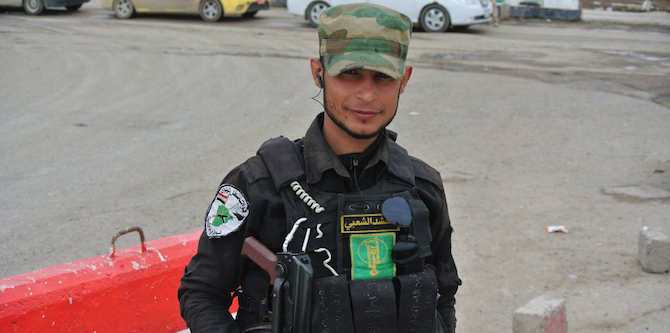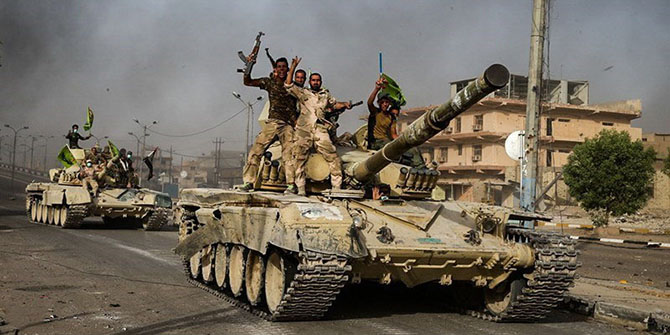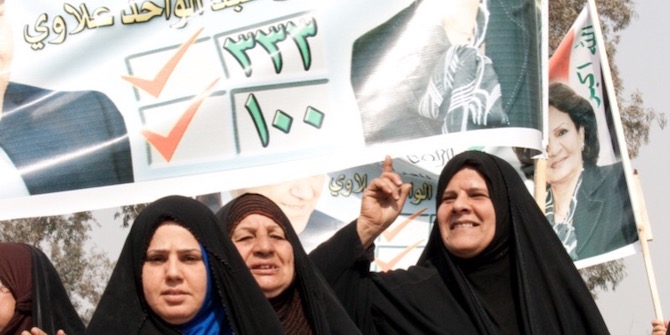by Dylan O’Driscoll and Dave van Zoonen
This post is based on the authors’ article ‘The Future of Iraq: Is Reintegration Possible?’ published in the Autumn 2017 issue of Middle East Policy.

In response to the Iraqi Security Forces’ (ISF) capitulation to the Islamic State (IS) in 2014 a whole host of militias – under the umbrella of the Popular Mobilisation Forces (PMF) – came to the fore to prevent IS’ further gains. Whilst more recently the ISF have made a dramatic recovery to once again lead the fight, the militias remain in place and a law has been passed that legitimises the PMF’s continued existence. The 50 plus militias that constitute the PMF represent all factions of society and herein lies the problem: rather than offering a national model, each militia tends to identify strongly with only one segment of Iraq’s diverse population thus deepening divisions along ethnosectarian lines. With elections planned for 2018 and several militias closely linked or aligned to political parties, this issue becomes a larger concern, as it hampers the democratic process in Iraq. It is therefore imperative that processes to minimise the influence of the militias and to strengthen the role of the national army are put into place.
Having one inclusive army, police force and border patrol operating under a unified command structure and accountable to civil bodies of oversight is not only an important symbol for fostering national unity, but also a primary prerequisite for an effective security sector. In the time ahead, Iraq must commit to the formation of an effective and accountable security sector through rigorous security sector reform (SSR) and the disarmament, demobilisation and reintegration (DDR) of former militia members. Currently however, significant obstacles to both SSR and DDR remain in place. According to a 2008 report by the US Government Accountability Office, the United Nations considers a secure environment, the inclusion of all belligerent parties, an overarching political agreement, sustainable funding, and the presence of reintegration opportunities as minimum requirements for successful DDR in Iraq. It is unlikely these conditions will be sufficiently met immediately following the defeat of IS. Therefore, efforts in the short term should first focus on creating an environment conducive to DDR.
The successful implementation of DDR hinges on the political will of all actors involved to reach and honour agreements. The main obstacle to a settlement is often related to the security dilemma that arises from forces having to disarm and demobilise in the absence of security guarantees. As long as Iraq is plagued by security threats – whether internal or external – sub-state armed groups are unlikely to show willingness to demobilise. In this regard, the recent referendum on independence held in the Kurdistan Region of Iraq on 25 September can be seen as compromising the prospects for DDR.
The recent history of Iraq in dealing with escalating ethnosectarian tensions suggests that the national army and police forces should be sufficiently diverse and inclusive, drawing members from local communities, in order to enable the provision of security and rule of law. The ISF is currently having to compete with the PMF for the population’s support, which is hindering Iraqi unity. Rebuilding the Iraqi army into a force that represents the entire population can be the building block of a wider unity project. The central government should, therefore, take measures to incentivise the recruitment of diverse, local units into the conventional security forces — potentially through affirmative action in recruitment and admission policies. Hence, the Iraqi army has to be promoted as – and ultimately become – a united force that represents the entire population capable of offering security to everyone.
Procedures to facilitate or incentivise the integration of individual militia members into the ISF need to be created. This could include affirmative rank-harmonisation policies in which, as appropriate, militia members join the conventional security forces at ranks equal to or slightly above their previous positions. Integration should be done at the individual rather than the unit level, to ensure loyalties are indeed transferred from the militias to the state. Additionally, strict vetting procedures must be in place to prevent infiltration of the security forces by extremist elements or perpetrators of war crimes as this would only serve to delegitimise the DDR process and the image of the ISF as a whole.
It is widely acknowledged that local ownership (and agency) is an important prerequisite for success. The central government must therefore take the lead in its design and implementation. Due to the prevalence of gun culture in Iraq, it is best to deviate from the conventional DDR standard of disarmament prior to demobilisation and integration. Depending on what the future security situation allows, it may be appropriate for Iraq to follow the Tajikistan model (1997–2001) – widely perceived as a success story – where reintegration of former fighters was prioritised and started even in the absence of adequate disarmament levels.
It is important, however, that options for reintegration are offered relative to the needs of the security sector and are based around principles of inclusion and diversity. Those who do not wish to integrate into the new armed forces should receive assistance for their reintegration into civilian life. Those battle-fatigued militia members will face a struggling national economy and see few opportunities to use their limited skillset in peacetime. Therefore, even in the absence of formal agreements with militia leadership, a programme offering assistance to individual fighters wishing to make the combatant-to-civilian transition needs to be established. A reintegration package should include psychosocial support mechanisms, healthcare and education benefits, vocational training and job placement. There should be a maximum spend per combatant, although specific types of assistance should be based on individual needs assessed through thorough processes.
Reintegration is a long-term process, and Iraq’s domestic economy may struggle to absorb the large numbers of ex-combatants into the labour market. Reintegration of ex-combatants back into poverty is not constructive and thus DDR should be implemented as part of a multi-dimensional effort that includes long-term development goals. The World Bank and the United Nations Development Programme both have global expertise in implementing DDR/SSR processes and connecting them to wider development programming.
If Iraq’s security forces are to enhance stability rather than threaten it, they must be unified under a single chain of command, become more accountable and sever direct links of patronage with foreign actors. The current situation is unsustainable and the fragility of peace following the defeat of IS is becoming increasingly visible as time goes on.
 Dylan O’Driscoll is a researcher at the Humanitarian and Conflict Response Institute at the University of Manchester. He has previously carried out extensive fieldwork in Iraq. He tweets @odriscoll_dylan
Dylan O’Driscoll is a researcher at the Humanitarian and Conflict Response Institute at the University of Manchester. He has previously carried out extensive fieldwork in Iraq. He tweets @odriscoll_dylan
 Dave van Zoonen is an independent conflict analyst based in Erbil, Iraq. He previously studied needs for reconciliation among minority communities in Iraq for the United States Institute of Peace (USIP). He tweets @DZoonen
Dave van Zoonen is an independent conflict analyst based in Erbil, Iraq. He previously studied needs for reconciliation among minority communities in Iraq for the United States Institute of Peace (USIP). He tweets @DZoonen







1 Comments